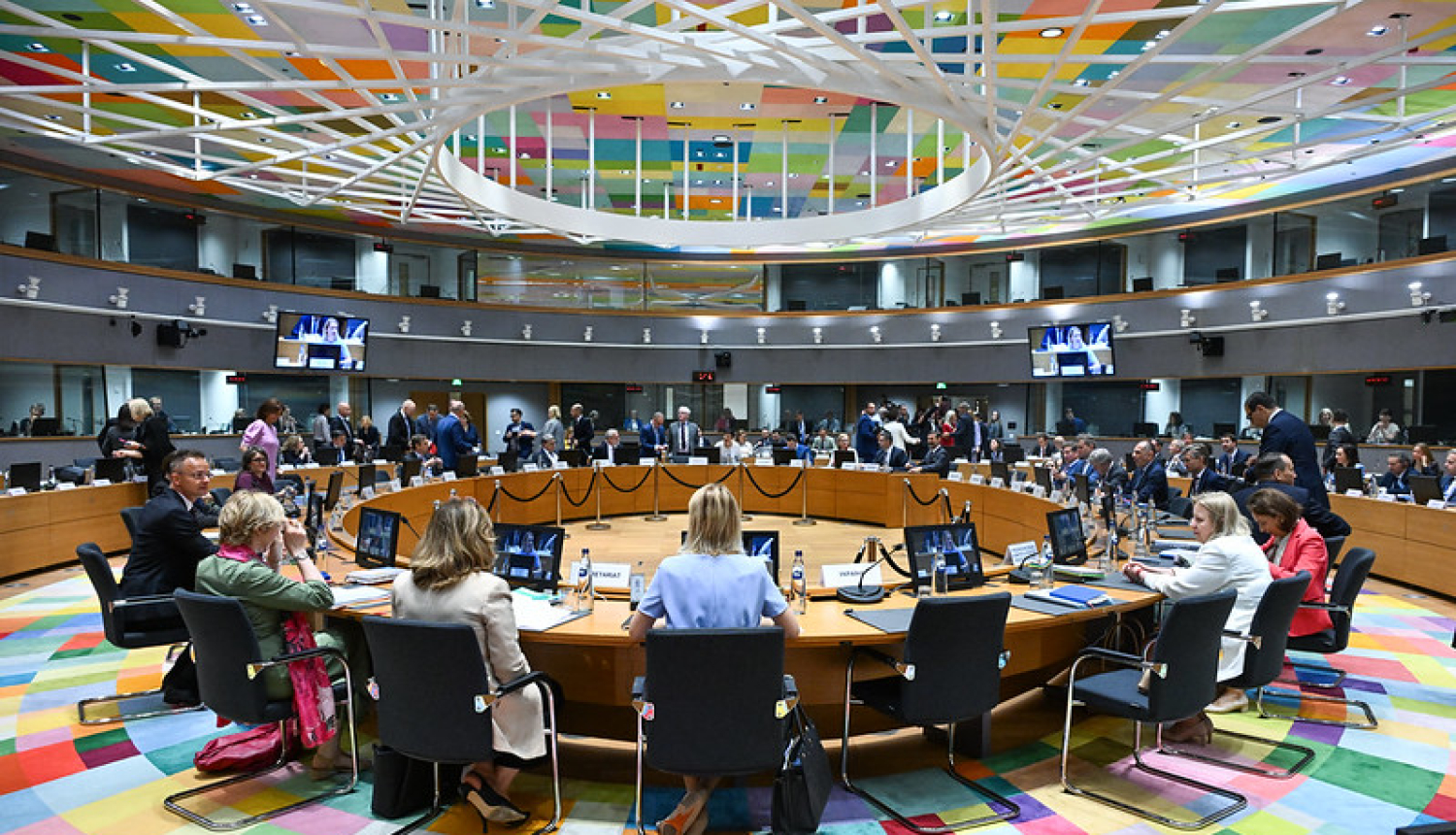On 23 June 2025, Parliamentary Secretary Artjoms Uršuļskis took part in the European Union (EU) Foreign Affairs Council meeting in Brussels, Belgium. The agenda included discussions on the EU’s 18th sanctions package against Russia, military support for Ukraine, and the situation in the Middle East in light of the ongoing conflict between Israel and Iran.
At the meeting, Artjoms Uršuļskis stated:
“As Russia’s war against Ukrainian civilians grows increasingly brutal, a steadfast EU focus on Ukraine is in the security interests of all Europe. The only way to stop Russia is to continue increasing military support for Ukraine and to intensify pressure on Russia. Ukraine needs a positive signal on its EU accession path. We must find a solution to begin accession negotiations with Ukraine, as it has fulfilled all the necessary criteria.”
The ministers discussed diplomatic efforts to achieve a ceasefire that would open the door to negotiations for a just and sustainable peace in Ukraine. They also deliberated on increasing joint EU and member state military support to Ukraine. One current objective is the initiative by the EU High Representative, Kaja Kallas, to supply Ukraine with 2 million rounds of large-calibre ammunition in 2025, amounting to EUR 5 billion.
Ukraine’s Foreign Minister Andrii Sybiha, who addressed the meeting in person, likewise called for increased EU military support and for tougher sanctions against Russia.
“Russia will only stop when we stop it,” emphasised Sybiha.
Artjoms Uršuļskis informed the EU foreign ministers:
“Our commitment to support Ukraine remains unwavering. Latvia will provide military aid to Ukraine amounting to at least 0.25% of its gross domestic product (GDP) both this year and next.”
Latvia’s support package includes large-calibre ammunition, explosives, anti-tank weapons, air defence systems, and other equipment. Latvia is investing in Ukraine’s military drone industry and is co-leading the Drone Coalition, established in 2024, together with the United Kingdom. This coalition now includes 18 countries. Latvia also plans to deliver 42 “Patria” 6x6 armoured vehicles to Ukraine this year.
The EU Foreign Affairs Council also discussed the adoption of the 18th sanctions package against Russia, targeting the country’s energy, banking, and financial sectors. The package includes further trade restrictions and robust action against sanctions evasion. It will also impose sanctions on individuals and companies supporting Russia’s aggression.
Artjoms Uršuļskis stressed:
“We must increase sanctions pressure on Russia by approving the 18th package as swiftly as possible. This will also help us move toward energy independence from Russia. Sanctions on Belarus must also be strengthened.”
The ministers agreed that the EU’s strategy to counter unconventional threats from Russia should be implemented swiftly and effectively. Artjoms Uršuļskis highlighted:
“To reduce unconventional threats, Latvia supports restricting the free movement of Russian diplomats within the Schengen area and closely scrutinising the issuance of tourist visas to Russian citizens. Latvia has adopted a decision that, as of 15 July 2025, Russian citizens holding a valid Schengen short-stay visa but lacking a biometric passport will no longer be allowed to enter Latvia. We urge other EU member states to take similar measures.”
The ministers also addressed the threats posed by Russia’s so-called “shadow fleet” and discussed possible legal solutions. Recent incidents in the Baltic Sea have highlighted problems in dealing with stateless vessels. Artjoms Uršuļskis urged fellow participants to maintain a unified and proactive dialogue with the flag states of the “shadow fleet”.
Situation in the Middle East
The EU Foreign Affairs Council also discussed the escalating conflict between Israel and Iran.
Artjoms Uršuļskis underlined:
“Iran must not be allowed to obtain a nuclear weapon. The United States has taken measures to counter these threats. Stability in the Middle East is crucial for global security and the economy. All parties involved must return to the negotiating table to reach a diplomatic solution. Latvia firmly opposes Iran’s support for Russia’s aggression against Ukraine and its aggressive regional policy. Latvia will continue to support and advocate for EU sanctions aimed at curbing Iran’s support for Russian aggression and its destabilising activities in the region.”
The ministers also explored possible EU actions in response to the humanitarian situation in the Gaza Strip. Discussions also focused on the situation in Libya, including EU support for United Nations mediation efforts. The Council adopted conclusions on Syria, including the addition of five Syrian individuals to the EU’s Global Human Rights Sanctions Regime due to their involvement in violence against the Alawite minority in coastal regions of Syria earlier this March.
EU–China Relations
In preparation for the 25th EU–China Summit in Beijing, the ministers discussed the dynamics of EU–China relations and a shared understanding of China’s impact on European security: including China’s support for Russia’s war in Ukraine, cyberattacks, and hybrid threats.
Democratic Backsliding in Georgia
The ministers also discussed the deteriorating state of democracy in Georgia, where the ruling authorities are hastily adopting new laws and legislative changes without an inclusive process, undermining fundamental human rights.
Background Information
The EU Foreign Affairs Council addresses issues related to external action, including the common foreign and security policy, European security and defence policy, external trade, and development cooperation. Its main objective is to ensure unity, consistency, and effectiveness in the EU’s external actions.




